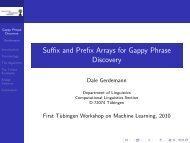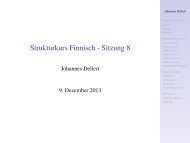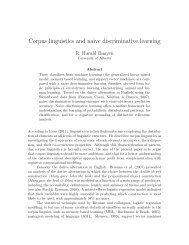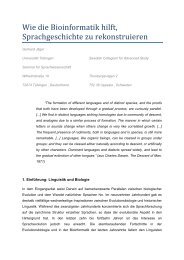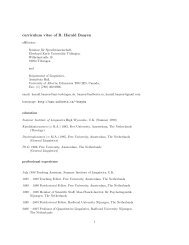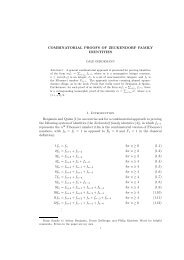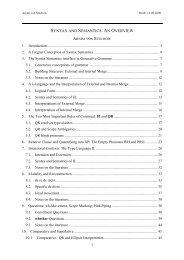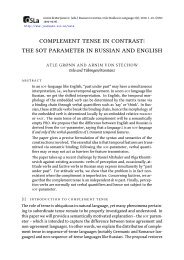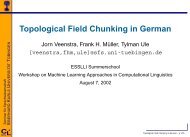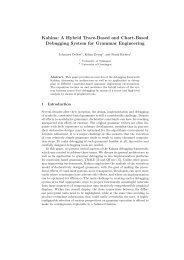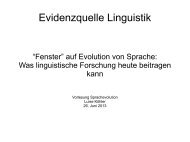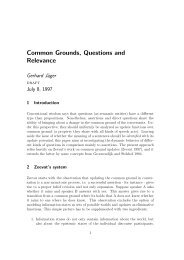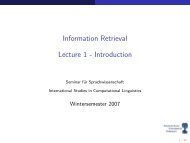A Treebank-based Investigation of IPP-triggering Verbs in Dutch
A Treebank-based Investigation of IPP-triggering Verbs in Dutch
A Treebank-based Investigation of IPP-triggering Verbs in Dutch
Create successful ePaper yourself
Turn your PDF publications into a flip-book with our unique Google optimized e-Paper software.
Will a Parser Overtake Achilles? First experiments<br />
on pars<strong>in</strong>g the Ancient Greek Dependency<br />
<strong>Treebank</strong><br />
Francesco Mambr<strong>in</strong>i∗ and Marco Passarotti†<br />
∗University <strong>of</strong> Cologne (Germany)<br />
†Università Cattolica del Sacro Cuore, Milan (Italy)<br />
Abstract<br />
We present a number <strong>of</strong> experiments on pars<strong>in</strong>g the Ancient Greek Dependency<br />
<strong>Treebank</strong> (AGDT), i.e. the largest syntactically annotated corpus <strong>of</strong><br />
Ancient Greek currently available (350k words ca). Although the AGDT is<br />
rather unbalanced and far from be<strong>in</strong>g representative <strong>of</strong> all genres and periods<br />
<strong>of</strong> Ancient Greek, no attempt has been made so far to perform automatic<br />
dependency pars<strong>in</strong>g <strong>of</strong> Ancient Greek texts. By test<strong>in</strong>g and evaluat<strong>in</strong>g one<br />
probabilistic dependency parser (MaltParser), we focus on how to improve<br />
the pars<strong>in</strong>g accuracy and how to customize a feature model that fits the dist<strong>in</strong>ctive<br />
properties <strong>of</strong> Ancient Greek syntax. Also, we prove the impact <strong>of</strong><br />
genre and author diversity on pars<strong>in</strong>g performances.<br />
1 Introduction<br />
Among the languages currently spoken <strong>in</strong> the world, Greek has one <strong>of</strong> the longest<br />
documented histories. The first texts written <strong>in</strong> Greek that have survived to our days<br />
date from the mid <strong>of</strong> the second millennium BCE (around 1420-1400). From the<br />
phase that is commonly known as Ancient Greek (9th Century BCE - 6th Century<br />
CE), a vast literature has been preserved and thoroughly studied. In rough numbers,<br />
two <strong>of</strong> the most important digital collection <strong>of</strong> Ancient Greek texts, which are far<br />
from be<strong>in</strong>g exhaustive, the Thesaurus L<strong>in</strong>guae Graecae (TLG) 1 and the Perseus<br />
Digital Library 2 , conta<strong>in</strong> respectively more than 105 and 13 million words.<br />
1.1 Annotated corpora <strong>of</strong> Ancient Greek<br />
Some <strong>of</strong> the Ancient Greek texts are today <strong>in</strong>cluded <strong>in</strong> two different treebanks.<br />
The Ancient Greek Dependency <strong>Treebank</strong> (AGDT) [3] is a dependency-<strong>based</strong><br />
treebank <strong>of</strong> literary works <strong>of</strong> the Archaic and Classical age published by Perseus 3 .<br />
1 TLG: http://www.tlg.uci.edu/, which goes so far as to the fall <strong>of</strong> Byzantium (1453 BCE).<br />
2 Perseus Digital Library: http://www.perseus.tufts.edu/hopper/<br />
3 AGDT: http://nlp.perseus.tufts.edu/syntax/treebank/greek.html<br />
133



